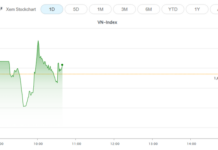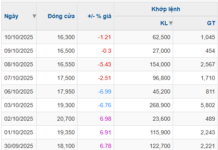Recently, at a meeting of the National Assembly’s Standing Committee regarding the revised Law on Value Added Tax (VAT), Chairman of the National Assembly’s Finance and Budget Committee, Le Quang Manh, suggested that the Government consider abolishing the exemption of VAT for imported goods with small values. This is because the value of imported goods via e-commerce (TMĐT) platforms such as Shopee, Lazada, and TikTok has reached billions of USD each month. This move aims to protect revenue sources and create a fair business environment domestically.
Spending billions of USD on imports each month
According to Mr. Manh, previously, the number of imported goods with small values was not significant, so the overall impact on revenue was negligible. However, with the current explosion of cross-border e-commerce, the volume of small-value goods has increased dramatically.
Mr. Manh cited data from Vietnam Post and Telecommunications Group (VNPT), indicating that as of March 2023, there were approximately 4-5 million orders per day from China to Vietnam, with each order valued between 100,000 and 300,000 VND. This means that, on average, approximately 45-63 million USD is spent daily and 1.3-1.9 billion USD monthly on small-value goods traded through e-commerce platforms such as Shopee, Lazada, Tiki, and TikTok.
According to the Chairman of the National Assembly’s Finance and Budget Committee, many countries have abolished the VAT exemption for imported goods with small values to protect revenue sources and create a fair business environment between domestically produced and imported goods.
This proposal has garnered quick support from businesses operating on e-commerce platforms. Nguyen Thanh Lien (residing in Ho Chi Minh City), the owner of a fashion shop on an e-commerce platform, believes that imposing VAT on cheap imported goods is crucial in the current context. It promotes fairness and reduces pressure on domestic sellers.
“Currently, domestic online sellers are subject to a tax fee of 1.5% of total revenue, plus other costs. The remaining profit is only 3%-4%, or even a loss in some months due to having to run promotional programs to compete with rivals and foreign goods.
If we sell at a higher price, customers will switch to buying from foreign shops as it’s cheaper. Customers tend to buy from sellers offering the lowest prices, with less regard for quality, while buying from domestic sources makes it easier to claim warranties and return items,” said Mr. Lien.
Huynh Thanh Ngan, owner of an online and offline home appliance store in Thu Duc City, expressed concern over the fact that Chinese and Korean shops on e-commerce platforms have been “exploiting” the Vietnamese market without paying any taxes or fees. Domestic stores are struggling to compete and their sales volume is dwindling. “In addition to VAT, I hope there will be additional policies to support sellers,” said Ms. Ngan.
Statistics from e-commerce data platform Metric show that due to increasingly fierce competition, over 105,000 sellers across the four platforms of Shopee, Lazada, Tiki, and Sendo left the market in 2023.

Domestic online sellers complain about the difficulty in competing with small-value imported goods from e-commerce platforms. Photo: HOANG TRIEU
Competing with core values
From an e-commerce expert’s perspective, Nguyen Binh Minh, member of the Executive Committee of the Vietnam E-commerce Association and Deputy Head of the Faculty of Economic Information Systems and E-commerce at the University of Commerce (Hanoi), stated that cross-border orders under 1 million VND are usually shipped as gifts, so they are not subject to VAT.
Without VAT collection, it is clear that businesses operating on e-commerce platforms from abroad will have a tax advantage, while domestic businesses have to pay full taxes and other costs.
According to Mr. Minh, domestic manufacturers and sellers cannot compete solely on price with giants like China because their production scale is massive, reaching billions of people, with millions of manufacturers, and highly developed logistics. Instead, domestic sellers need to leverage advantages in quality, branding, market understanding, cost control, and supply chain management to reach consumers.
“Cross-border goods entering Vietnam also need to be strictly controlled in terms of origin to avoid counterfeits and low-quality products. Sellers on e-commerce platforms also need to develop core products, build brands, and apply technology to establish relationships with buyers, instill trust, and make their products more competitive,” suggested Mr. Minh.
Similarly, expert Luu Thanh Phuong, who once owned an e-commerce platform in Vietnam, believes that VAT imposition will only benefit sellers in the short term. In the long run, sellers on e-commerce platforms themselves need to optimize search engine optimization (SEO) and leverage the policies of e-commerce platforms to reach customers and promote products.
In Vietnam, most online sellers are individuals and do not have the capacity to gather market information quickly. Therefore, they cannot keep up with market trends as effectively as foreign shops from countries like China and Korea.
“Online sellers in Vietnam need to collaborate and share supply sources, sales experiences, and product promotion strategies. They should also identify target customer groups and cooperate with key opinion leaders (KOLs) and key opinion consumers (KOCs) to effectively introduce products to the right audience. If domestic sellers focus solely on price, they will find it challenging to compete with cross-border sellers, especially those from China, which is known as the world’s factory, where production costs are extremely low,” said Mr. Phuong.
Imposing additional import taxes and regulations
Le Hong Duc, founder of OneAds Digital, believes that imported goods through e-commerce platforms mainly come from China and are sold at very low prices, with some items costing only a few hundred thousand VND or even a few tens of thousands of VND. Therefore, imposing a 10% VAT may not have a significant impact. To ensure fairness, additional import taxes and environmental protection fees should be imposed, as is done in Western countries for fast fashion items.
“Regulatory agencies need to establish additional import regulations, such as quality inspections and standards, especially since small-value cross-border orders often lack quality assurance, and counterfeit and imitation goods are flooding the Vietnamese market, harming both consumers and legitimate manufacturers and businesses. It is also necessary to set standards and hold e-commerce platforms accountable if they allow non-compliant cross-border goods into Vietnam,” suggested Mr. Duc.




































